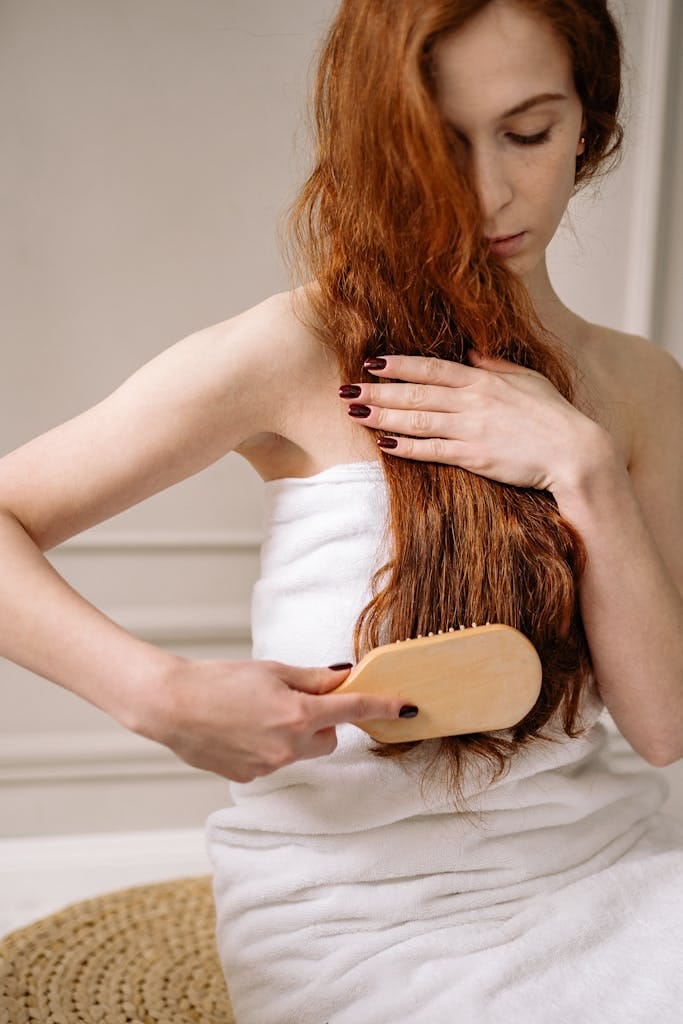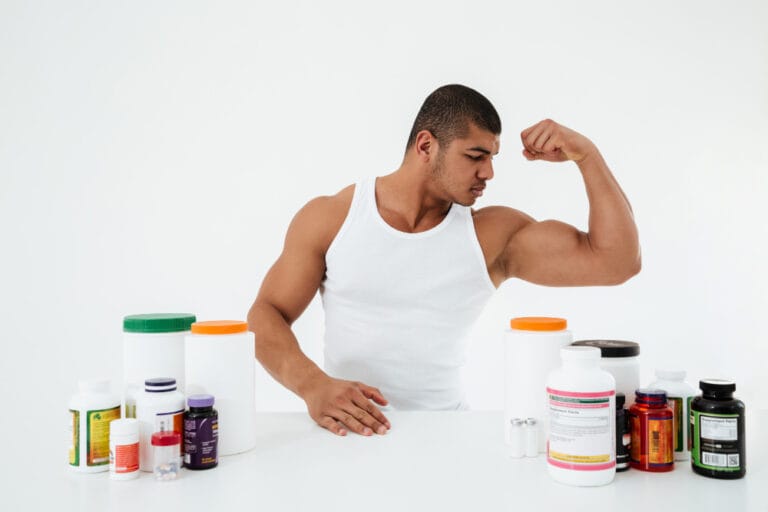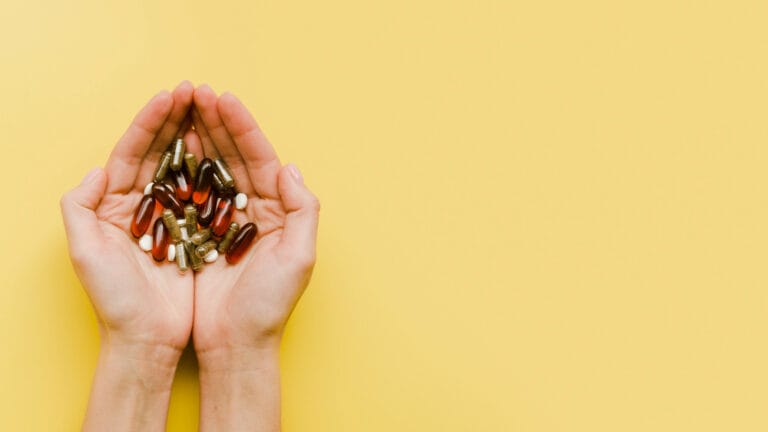FREE SHIPPING OVER $50
Hair Loss? A Naturopathic Doctor’s 4 Must-Have Supplements for Thicker, Fuller Hair

Few things can feel as disheartening as looking in the mirror and seeing more hair on your brush than on your head. Whether it’s sudden shedding, gradual thinning, or patches disappearing, hair loss can significantly impact your confidence and make you feel less like yourself. You’ve likely tried various shampoos, scalp treatments, or even prescription options, often with frustratingly slow or limited results.
But what if the solution isn’t just topical? What if your body is signaling something deeper, and the key to thicker, fuller hair lies in addressing imbalances from within? As a naturopathic doctor, I frequently see how nutritional deficiencies, stress, and underlying systemic issues play a massive role in hair health. That’s why I’m here to share my 4 must-have supplements that truly nourish your follicles, support healthy hair growth, and can help you reclaim your luscious locks.
Understanding Hair Loss: A Naturopathic Perspective
Before we jump into the supplements, it’s crucial to understand that hair loss is rarely just a cosmetic issue. From a naturopathic viewpoint, your hair is often a barometer of your overall health. When your body is under stress, lacking essential nutrients, or dealing with imbalances, one of the first things it might do is shunt resources away from “non-essential” functions – like growing new hair.
Common underlying factors that can contribute to hair loss include:
- Nutritional Deficiencies: A common culprit! Lack of specific vitamins and minerals (like iron, vitamin D, zinc, biotin) can directly impair hair follicle function.
- Hormonal Imbalances: Thyroid dysfunction (hypothyroidism), elevated androgens (like DHT), and even fluctuating estrogen levels can all contribute to shedding.
- Chronic Stress: Prolonged stress can push hair follicles prematurely into the resting (telogen) phase, leading to significant shedding (telogen effluvium).
- Inflammation: Systemic inflammation can impact scalp health and hinder optimal hair growth.
- Poor Gut Health: An unhealthy gut can lead to nutrient malabsorption, impacting the availability of vitamins and minerals crucial for hair.
My Top 4 Must-Have Supplements for Thicker, Fuller Hair
Based on clinical experience and scientific evidence, these are the vitamins and supplements I consistently recommend to my patients looking to combat hair loss and promote thicker, fuller hair.
1. Vitamin D
Often referred to as the “sunshine vitamin,” Vitamin D is far more than just a bone-health nutrient. Its role in hair growth is increasingly recognized, and deficiency is surprisingly widespread.
- Why it’s a “Must-Have”: Vitamin D plays a crucial role in regulating the hair follicle cycle, particularly by stimulating dormant follicles to enter the growth (anagen) phase. Adequate levels are essential for creating new hair follicles, not just maintaining existing ones. Deficiency in Vitamin D has been linked to various types of hair loss, including telogen effluvium and alopecia areata.
- How it Works: Hair follicles have Vitamin D receptors, indicating its direct involvement in the complex process of hair production. Optimal Vitamin D levels help ensure these cycles run smoothly, preventing premature shedding and promoting consistent hair growth.
- Dosage & Form (General Guidance): Aim for at least 2,000-5,000 IU (International Units) of Vitamin D3 daily, but the ideal dosage should always be guided by a blood test to determine your current levels. Most adults need higher doses to reach optimal levels (typically above 40-60 ng/mL).
- Important Considerations: Vitamin D is fat-soluble, so taking it with a meal containing healthy fats (like avocado or nuts) can significantly improve absorption. It’s also often recommended to take it alongside Vitamin K2 to ensure proper calcium utilization.
2. Iron (Specifically, Optimizing Ferritin Levels)
Iron deficiency is one of the most common nutritional deficiencies globally, and it’s a frequent, yet often overlooked, cause of hair loss, particularly in women but also in men.
- Why it’s a “Must-Have”: Iron is essential for carrying oxygen to cells throughout your body, including your hair follicles. It also plays a vital role in energy production within these cells. When iron levels are low, your body prioritizes oxygen for vital organs, and hair follicles often suffer, leading to shedding and thinning. We’re looking beyond just basic iron levels; ferritin, which indicates your body’s iron stores, is the key marker for hair health.
- How it Works: Adequate iron ensures your hair follicles receive the oxygen and nutrients they need to grow strong, healthy strands. Low ferritin levels often correlate with increased hair shedding (telogen effluvium). Replenishing these stores helps the hair cycle return to normal.
- Dosage & Form (General Guidance): Iron supplementation must be guided by blood tests and a healthcare professional. Taking iron when you don’t need it can be harmful. If deficient, a typical dose might range from 25-60 mg of elemental iron daily.
- Important Considerations: Take iron supplements with Vitamin C (like orange juice) to enhance absorption. Avoid taking iron with calcium, coffee, or tea, as these can inhibit absorption. Be aware that iron can cause constipation; consuming fiber-rich foods and staying hydrated can help.
3. Marine Collagen
Collagen is the most abundant protein in your body, providing structure to your skin, bones, and yes, your hair. While bovine collagen is common, marine collagen is often preferred for its superior bioavailability and type I collagen content, which is abundant in skin, hair, and nails.
- Why it’s a “Must-Have”: Marine collagen is rich in specific amino acids, particularly proline, glycine, and hydroxyproline, which are the building blocks of keratin – the protein that makes up your hair. It also supports the health of the dermal layer of your skin, where hair follicles are rooted.
- How it Works: By providing the raw materials for keratin production, collagen can strengthen hair strands, making them less prone to breakage and brittleness. It also supports the elasticity and hydration of the scalp, creating a healthier environment for hair growth. Some studies suggest it can act as an antioxidant, combating damage to hair follicles.
- Dosage & Form (General Guidance): Typically, a daily dose of 5-10 grams of marine collagen powder is recommended. It’s usually unflavored and dissolves easily in hot or cold liquids.
- Important Considerations: Look for hydrolyzed marine collagen peptides for optimal absorption. While side effects are rare, some might experience mild digestive upset initially. It’s a fantastic addition to smoothies, coffee, or even just water.
4. Omega-3 Fatty Acids (EPA/DHA)
These essential fatty acids, primarily found in fatty fish, are powerful anti-inflammatory agents that play a vital role in overall health, including the health of your scalp and hair follicles.
- Why it’s a “Must-Have”: Chronic inflammation, often unseen, can hinder healthy hair growth and even contribute to hair loss. Omega-3s help quell this inflammation, creating a more conducive environment for your hair follicles to thrive. They also contribute to the overall nourishment of hair follicles and potentially improve scalp circulation.
- How it Works: EPA and DHA help regulate the inflammatory response in the body. A healthier, less inflamed scalp is better equipped to support robust hair follicle activity. These fats also contribute to the integrity of cell membranes, including those in hair follicles, promoting stronger, more resilient hair strands.
- Dosage & Form (General Guidance): Aim for a daily supplement providing at least 1,000-2,000 mg of combined EPA and DHA.
- Important Considerations: Choose a high-quality, third-party tested fish oil supplement to ensure purity and potency, free from heavy metals. If you’re vegetarian or vegan, algal oil is an excellent plant-based source of EPA and DHA. Take with food for better absorption and to minimize any potential fishy burps.
Conclusion
Dealing with hair loss can be incredibly frustrating, but I want to assure you that hope for thicker, fuller hair is very real. By understanding the underlying factors and embracing a holistic approach, you can truly transform your hair health.
These 4 must-have supplements are powerful tools in a naturopathic doctor’s arsenal because they address common deficiencies and physiological imbalances that often contribute to shedding and thinning.
Remember, every individual is unique. While these supplements are broadly beneficial, it’s always best to consult with a healthcare professional, like a naturopathic doctor or a dermatologist, before starting any new supplement regimen. They can help identify specific deficiencies through testing and tailor a plan that’s just right for you.
Related Articles
- Tired, Anxious, Cramping? Your Body’s 8 Urgent Signs You’re Low on Magnesium
- Doctors Reveal: The 5 Powerhouse Vitamin Combos You Need for Optimal Health
- Tired All the Time? This Powerhouse Supplement Boosts Focus, Stamina & Overall Vitality
- This is It: The #1 Gut Health Supplement GI Doctors Swear By (Expert Revealed!)
- Creatine for Youth & Muscle? My 30-Day Experiment (The Shocking Truth!)







